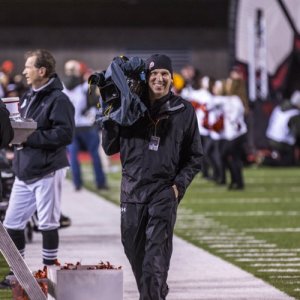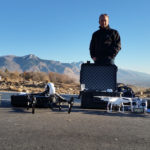I recently had the chance to ask the University of Utah’s Director of Video and Broadcast services, Eugene Skip Whitman, a few questions about his experience with and views on drones in sports media.
Dominic Austin: First, could you give a brief description of your job here at the University of Utah?
Skip Whitman: I manage all aspects of video and television broadcasts for all athletic teams and events, liaison to the Pac-12 Network, financial budgeting of new equipment and maintenance, research and report latest technology for implementation into facilities for in-game entertainment as well as broadcast purposes, manage and coordinate video coverage of all sporting events, capture and archive all sporting events for historical purposes, oversee video production of all events for social media consumption, handle all video production for marketing videos for baseball, football, gymnastics, men’s/women’s basketball, provide coachs with video for men’s/women’s basketball, soccer, baseball and softball, Pac-12 Network Liaison for live broadcasts and Basketball Instant Replay system, promote and provide footage to the Pac-12, and provide a point of contact and delivery for all athletic archived video requests
Dominic Austin: Next, how are drones incorporated into your duties in your position? Basically, what experience do you have with drones?
Skip Whitman: We have used our drones for numerous video projects that have included capturing aerial footage of the Ute Indian Tribe Reservation, beautiful scenic shots of Rice Eccles Stadium during a football game or to capture aerial footage of a construction project on campus.
Dominic Austin: How do you think drones could improve media coverage of sports?
Skip Whitman: When it comes to media coverage of sporting events the drone isn’t really going to improve the coverage of the event. The only real use for a drone during an event would be to capture scenic shots of the venue, similar to what a blimp is used for during broadcasts.
Dominic Austin: How could drones be a danger during sporting events?
Skip Whitman: Without proper training, a drone can be very unpredictable in the way it responds to the controller, which could cause it to become a projectile falling from the sky.
Dominic Austin: What do you think about drones versus the sky-cam?
Skip Whitman: Drones could be a great replacement for the blimp, especially in a financial sense. A drone has the ability to capture stunning ariel footage of a venue during an event. However, it’s flight time is limited by the battery life which is relatively short. These scenic type shots are general used as bump in and bump out from commercial breaks or as billboards for the broadcaster to run ads on. The sky-cam is a very versatile tool that has dramatically increased the viewer’s experience at home. It has the ability to put the viewer right in the middle of game action or inside a huddle during a timeout. The Sky-Cam is a system that runs on steel cables that are secured to the stadium and must undergo strict safety inspections before it is able to be installed in a stadium.
Dominic Austin: How would you use a drone for footage during a sporting event given full range of use and no restrictions?
Skip Whitman: If there were no restrictions, I don’t think I would use it any differently than I have in the past. With it’s limited battery supply (approx. 12 minutes of flight time) I would generally use it to capture scenic shots of our stadium at sunset or to showcase our beautiful campus. I do not see a place for them inside occupied stadiums.
Dominic Austin: Finally, where do you see drones and the media heading? Do you think a halt on drone usage will come at the end of the year, or do you see the field of drones growing in the near future?
Skip Whitman: I’m not sure where the regulations are heading, but I do understand the safety concerns that drones have raised. I am hopeful that when the regulations are put in place at the end of the year that there will be special permits that can be issued for drone operators who have received clearance based on the purpose of the flight. The drone has been a great asset for our video production team, which has given us the ability to capture aerial footage at a fraction of the cost in order to showcase our incredibly beautiful campus.



